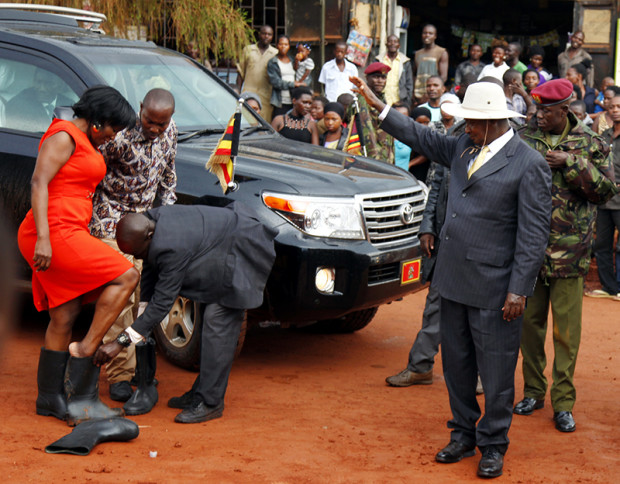Is President Yoweri Museveni weak, indecisive, and therefore, deserving little credit as a leader? That is the view some people have of leaders who dance like weathervanes to every whim of every mob of voters.
Those thoughts come to mind regarding a recent meeting at Rwakitura between Museveni, a bunch of Kampala councilors, vendors, and NRM people, and Kampala Capital City Authority (KCCA) Executive Director Jennifer Musisi.
People in that meeting say the things we see in films about how the Roman chief, Pontius Pilate, handed Jesus to the mob is nothing compared to what Museveni did to Musisi. By some accounts, Museveni literally cheered and clapped as the Kampala mob verbally flogged Musisi. Many things happened after that but they will be told on another day.
Following that, we must ask whether Museveni has it in him to apologise when he wrongs someone. Even if he usually doesn’t, he should this time do to Musisi whatever it is that 72-year old army generals who happen to misbehave do in form of apology. Added to his post-election comments claiming Musisi’s work cost him votes sounded, to many of us, like the proverbial kicking of the donkey that carries one’s load.
President must do whatever it is that 72-year old army generals who happen to misbehave do in form of apology
Yet all could have been avoided if Museveni appreciated two realities most good public sector managers face: First, that causing change in the public sphere is more difficult than brushing the teeth of a crocodile under water, and two, that the best results of their work are often interred under the weight of their smallest failures.
If Museveni’s objective in sacrificing Musisi to the mob is an attempt to realign his forces in the fight with his nemesis in Kampala Lord Mayor, Erias Lukwago, then he is fatally mistaken. Museveni is cutting off the head to cure the heart.
Musisi is not the cause of NRM’s problems in Kampala. To understand, Museveni should not be asking his mob of voters. He should ask business leaders and Kampala residents.
But since Museveni is a political animal, there is a little book he could read titled, ` Public Policy Investment: Priority Setting and Conditional Representation in British Statecraft’ by public policy professors Anthony Bertelli and Peter John. It is a relatively contemporary book published in 2013 and it grapples with the questions Museveni is faced with i.e. faced with irrational political behaviours of the Museveni type, whether there is a sensible reason for a rational politician to be responding to insensible voters. The book authors think there isn’t and give examples of former UK Prime Ministers Margaret Thatcher and Tony Blair who pushed correct but unpopular policies down the voter’s throats and went on to win re-election.
Museveni needs to be told that for a public entity like KCCA to be politically valuable to him; its success should not be measured in votes. It can only be gleaned from the welfare of beneficiaries of the public entity’s services.
Most people adore Musisi for ridding Kampala of dust, floods, congestion, and garbage. Many more enjoy the green parks, the night walks under the city’s solar lights, the new markets and hospitals, and the improved industrial area and suburbs of Makindye, Bugolobi, Bulange, and Ntinda.
But even these might miss one major point. That Musisi has single-handedly brought respectability to the city administration and restored pride in our city. People who appreciate these things might be few today, but they will increase if there is no policy reversal.
Secondly, Musisi’s Key Performance Indicators surely did not involve ensuring that her actions are politically correct.
They should have focused mainly on what every change manager does; sticking to the correct path while doing bad things that need to be done. Musisi is a queen of that art. She could be knocking vendors off the streets, kicking a Lord Mayor out of office, or simply demolishing a widow’s house that sits illegally on some portion of her coveted city but her smile would remain splattered firmly on her face. The only sign that she appreciates the pain her mission inflicts would be detected in her eyes – tiny, steely lobes dancing with the fire of determination. Her steeliness is a visor for her conviction that her perceived victims are martyrs of the mission. Her fortitude is more forceful than her fondness for effulgence. It is tough love for her city and its people.
In just four years, Musisi has overcome three of the four main failure factors of public sector managers, namely; lack of commitment to the task, limited time scope to do the job, and bureaucratic entanglement.
Until now, her preferred strategy for tackling the fourth obstacle – the often divergent interests of a multiplicity of power centres – appears to have been two-pronged; ride on it when it suits her and shrug it off when it hurts. Museveni’s recent treatment of her work hurts and unfortunately, she cannot shrug him away.
Fortunately, Musisi has shown she can be smart. She will understand that now is the best time for her to court the support of critical interest groups, beyond Museveni, to ensure that her mission at KCCA is not snared. The Minister for Kampala has clearly spoken out in her support. Together they can ensure that the forces of subversion are overwhelmed.
Museveni is not the first person to criticise Musisi for behaving like she is a bureaucrat and acting as if the only measure of her success is measuring it against her mission to fix Kampala.
In response, Musisi now needs to show that she is a leader not a bureaucrat. As they say, she needs to see around the barriers around her, and not merely knock them over. That involves redefining her mission to be comprehensive in improving the welfare of all city residents, not a select few. To win over all stakeholders, she must explain more and her team must show an awareness of Kampala’s realities and exude empathy. Instead of business model KPIs, KCCA must try for a balanced scorecard; with all inclusive strategic performance objectives that focus on the welfare of beneficiaries, value for money, methods of work, and flexibility.
In any case, Musisi needs to figure out her next steps so clearly that her legacy remains intact even if she leaves KCCA. It is a prospect even grouchy Museveni shouldn’t allow, of course.
jwere@independent.co.ug
 The Independent Uganda: You get the Truth we Pay the Price
The Independent Uganda: You get the Truth we Pay the Price




